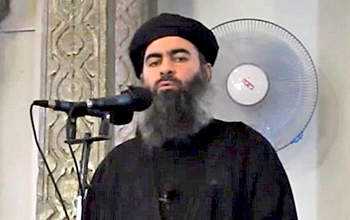 Baghdad, Nov 10: Iraqi Interior Ministry confirmed Sunday that the Islamic State (IS) top leader Abu Bakr al-Baghdadi was injured in a air strike, which killed several senior leaders of the extremist group, state-run Iraqiya news channel reported.
Baghdad, Nov 10: Iraqi Interior Ministry confirmed Sunday that the Islamic State (IS) top leader Abu Bakr al-Baghdadi was injured in a air strike, which killed several senior leaders of the extremist group, state-run Iraqiya news channel reported.
Earlier in the day, a security official from Iraq's northern province of Nineveh, however, told Xinhua that he could not confirm reports saying an air strike by the US-led coalition targeted a convoy of vehicles near the city of Mosul, the capital of Nineveh province.
"We can't confirm the news of death or wounding of Abu Bakr al- Baghdadi, because all what we have is our intelligence reports which only mentioned that some 45 IS militants were killed and wounded by the air strikes of the US-led coalition near Mosul late Friday," Mohammed Ibrahim, head of security committee of Nineveh's provincial council said.
Ibrahim also said that at least two IS senior figures, Libyan and Saudi nationals, were among the dead during the coalition air strikes which destroyed several armed vehicles and positions of the IS militant group.
On Saturday, Colonel Patrick Ryder, a Central Command spokesman, said in a statement that he could not confirm whether IS top leader Abu Bakr al-Baghdadi was in the vehicle convoy consisting of 10 armed trucks.
Abu Bakr al-Baghdadi, known to his supporters as Amir al-Mu' minin, is the Caliph of the self-proclaimed Islamic State which announced the establishment of a caliphate June 29, 2014.
The militant group captured the areas in western and northwestern Iraq as well as part of northeastern Syria.
On Oct 4, 2011, the US listed al-Baghdadi as a global terrorist and announced a reward of up to $10 million for information leading to his capture or death. Only the leader of al-Qaida, Ayman al-Zawahiri, merits a larger reward of $25 million.





Comments
Add new comment